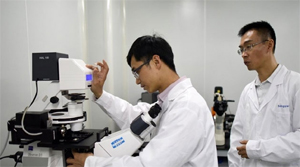



Date:22/08/17
 After "talking" with the patient, the artificial intelligence (AI) "doctor" provides a checklist according to the symptoms and prescribes the optimal medical treatment based on the diagnosis.
After "talking" with the patient, the artificial intelligence (AI) "doctor" provides a checklist according to the symptoms and prescribes the optimal medical treatment based on the diagnosis.
What all human doctors need to do is to verify the therapy.
That's a typical application scenario of this AI "doctor" fitted with the clinical decision support system (CDSS) developed by a team led by Peng Shaoliang, deputy director of the National Supercomputing Center in Changsha.
It made its debut at a seminar held by the University of South China in Hengyang city, in central China's Hunan Province on Saturday, during which it gave diagnoses in 100 clinical cases in 4.8 seconds, with an accuracy of 98 percent.
Dubbed "Big Superman" by doctors, this domestically-made "doctor" has been equipped with the technologies of clinical big data, supercomputing and AI.
It requires an AI algorithm as the core, clinical big data as support evidence and supercomputing power to do online computing for the "robot doctor" to fully perform its duties, said Peng and his colleague Doctor Wei Hong.
It has stored tens of millions of cases and built up diagnostic models of over 30 diseases, including tuberculosis and depression which has a high misdiagnosis rate.
The models' updating and complicated algorithm are all operated by China's Tianhe-2 supercomputer system and based on trial tests in some of the country's first-class hospitals, the AI "doctor" scores 20 percent higher in diagnosis accuracy than traditional diagnosis.
It is designed as a general practitioner, said Peng, and can constantly acquire new medical knowledge, experiences and diagnosis procedures, as well as new knowledge in designated medical databases at home and abroad.
It is able to learn to diagnose a new disease every one to two weeks, he added.
However, it won't replace human doctors, but act as an assistant to them, said Kang Xixiong, director of the clinical laboratory diagnostics department at Capital Medical University.
"The AI doctor will assist human doctors rather than replace them," Kang said, adding that the system aims to free human doctors from heavy workloads and make mutual improvement.
"For China's medical institutions, especially those in poor areas, AI would be a good assistant," he added.
Chinese scientists develop AI that gives diagnoses with 98 percent accuracy
 After "talking" with the patient, the artificial intelligence (AI) "doctor" provides a checklist according to the symptoms and prescribes the optimal medical treatment based on the diagnosis.
After "talking" with the patient, the artificial intelligence (AI) "doctor" provides a checklist according to the symptoms and prescribes the optimal medical treatment based on the diagnosis.What all human doctors need to do is to verify the therapy.
That's a typical application scenario of this AI "doctor" fitted with the clinical decision support system (CDSS) developed by a team led by Peng Shaoliang, deputy director of the National Supercomputing Center in Changsha.
It made its debut at a seminar held by the University of South China in Hengyang city, in central China's Hunan Province on Saturday, during which it gave diagnoses in 100 clinical cases in 4.8 seconds, with an accuracy of 98 percent.
Dubbed "Big Superman" by doctors, this domestically-made "doctor" has been equipped with the technologies of clinical big data, supercomputing and AI.
It requires an AI algorithm as the core, clinical big data as support evidence and supercomputing power to do online computing for the "robot doctor" to fully perform its duties, said Peng and his colleague Doctor Wei Hong.
It has stored tens of millions of cases and built up diagnostic models of over 30 diseases, including tuberculosis and depression which has a high misdiagnosis rate.
The models' updating and complicated algorithm are all operated by China's Tianhe-2 supercomputer system and based on trial tests in some of the country's first-class hospitals, the AI "doctor" scores 20 percent higher in diagnosis accuracy than traditional diagnosis.
It is designed as a general practitioner, said Peng, and can constantly acquire new medical knowledge, experiences and diagnosis procedures, as well as new knowledge in designated medical databases at home and abroad.
It is able to learn to diagnose a new disease every one to two weeks, he added.
However, it won't replace human doctors, but act as an assistant to them, said Kang Xixiong, director of the clinical laboratory diagnostics department at Capital Medical University.
"The AI doctor will assist human doctors rather than replace them," Kang said, adding that the system aims to free human doctors from heavy workloads and make mutual improvement.
"For China's medical institutions, especially those in poor areas, AI would be a good assistant," he added.
Views: 373
©ictnews.az. All rights reserved.Similar news
- Azerbaijani project to monitor disease via mobile phones
- Innovative educational system to be improved under presidential decree
- NTRC prolongs license of two TV and radio organizations for 6 years
- Azerbaijan establishes e-registry for medicines
- Azerbaijani museum introduces e-guide
- Nar Mobile opens “Nar Dunyasi” sales and service center in Siyazan city
- International conference on custom electronic services held in Baku
- OIC secretary general to attend COMSTECH meeting in Baku
- Azerbaijan develops earthquake warning system
- New law to regulate transition to digital broadcasting in Azerbaijan
- Azerbaijani State Social Protection Fund introduces electronic digital signature
- Intellectual traffic management system in Baku to be commissioned in December
- Tax Ministry of Azerbaijan started receiving video-addresses
- World Bank recommends Azerbaijan to speed up e-service introduction in real estate
- Azerbaijan to shift to electronic registration of real estate





















